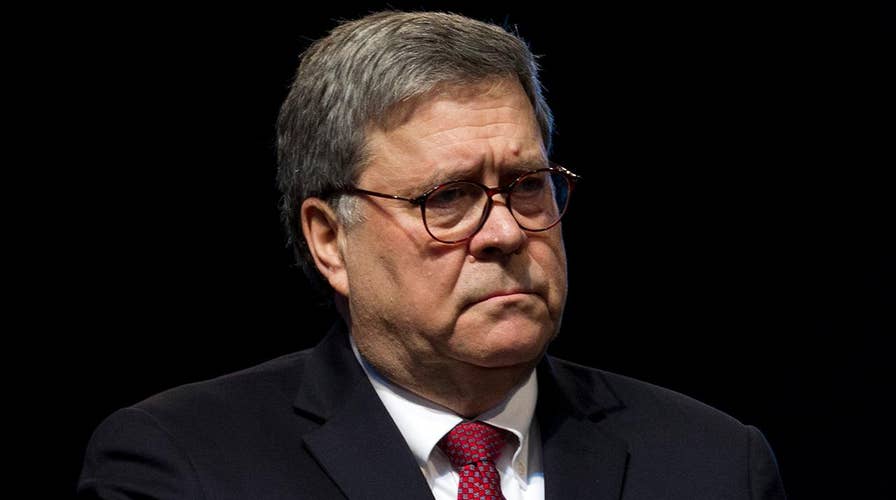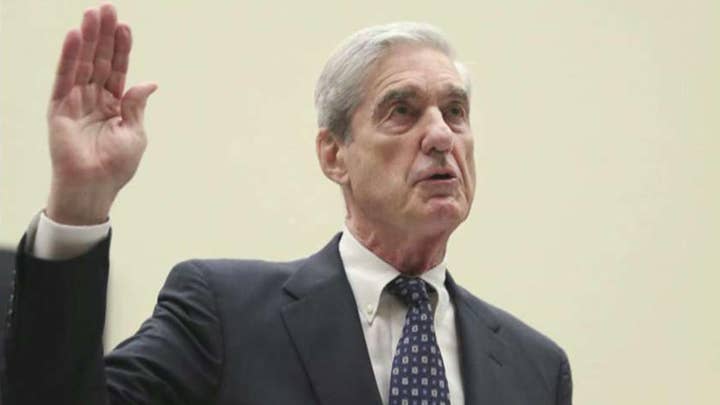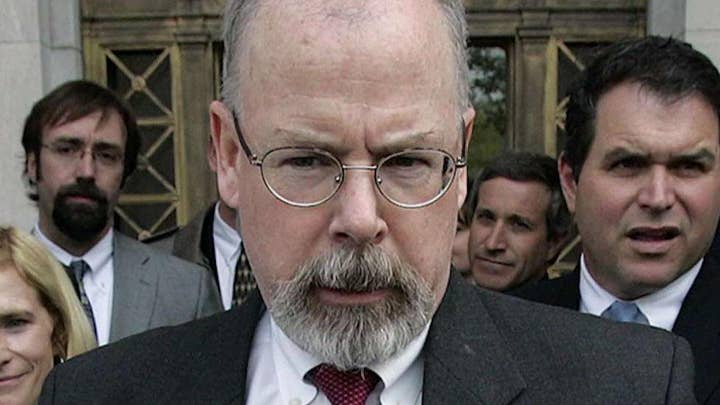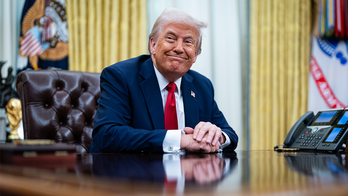CIA, FBI and DNI work with Attorney General Bill Barr to determine the origins of the Trump-Russia probe
Former Assistant U.S. Attorney Andy McCarthy says that Inspector General Michael Horowitz’s oversight investigation is not a 'fishing expedition.'
The Justice Department’s internal review of the Russia investigation is zeroing in on transcripts of recordings made by at least one government source who met with former Trump campaign aide George Papadopoulos overseas in 2016, specifically looking at why certain "exculpatory" material from them was not presented in subsequent applications for surveillance warrants, according to two sources familiar with the review.
The sources also said the review is taking a closer look at the actual start date of the original FBI investigation into potential collusion between members of the Trump campaign and the Russians, as some allege the probe began earlier than thought. Both components are considered key in the review currently being led by Attorney General Bill Barr and U.S. Attorney from Connecticut John Durham -- an effort sure to draw more attention in the coming weeks and months now that Robert Mueller's testimony is in the rearview.
REPUBLICANS CONFRONT MUELLER WITH ALLEGATIONS OF DOUBLE STANDARD IN RUSSIA PROBE
The recordings in question pertain to conversations between government sources and Papadopoulos, which were memorialized in transcripts. One source told Fox News that Barr and Durham are reviewing why the material was left out of applications to surveil another former Trump campaign aide, Carter Page.
“I think it’s the smoking gun,” the source said.
“These recordings have exculpatory evidence,” the other source added. “It is standard tradecraft to record conversations with someone like Papadopoulos—especially when they are overseas and there are no restrictions.”
Prior to the 2016 presidential election, Papadopoulos met with Maltese professor Joseph Mifsud in London, who told him that the Russians had dirt in the form of emails that could damage Hillary Clinton’s presidential campaign. Papadopoulos then told Australian diplomat Alexander Downer of the new information. Downer reported Papadopoulos’ comments to him to the FBI.
A source told Fox News that the "exculpatory evidence" included in the transcripts is Papadopoulos denying having any contact with the Russians to obtain the supposed "dirt" on Clinton.
But Papadopoulos did not only meet with Mifsud and Downer while overseas. He met with Cambridge professor and longtime FBI informant Stefan Halper and his female associate, who went under the alias Azra Turk. Papadopoulos told Fox News that he saw Turk three times in London: once over drinks, once over dinner and once with Halper. He also told Fox News back in May that he always suspected he was being recorded. Further, he tweeted during the Mueller testimony about "recordings" of his meeting with Downer.
It is unclear, at this point, which of these individuals may have recorded conversations with Papadopoulos.
Former Rep. Trey Gowdy, R-S.C., now a Fox News contributor, first signaled the existence of transcripts of secretly recorded conversations between FBI informants and Papadopoulos earlier this year.
“If the bureau’s going to send in an informant, the informant’s going to be wired, and if the bureau is monitoring telephone calls, there’s going to be a transcript of that,” Gowdy said in May on Fox News' “Sunday Morning Futures,” acknowledging he was aware of the files and suggesting they included exculpatory information.
TREY GOWDY: SECRET FBI TRANSCRIPTS FROM RUSSIA PROBE COULD BE 'GAME-CHANGER'
“Some of us have been fortunate enough to know whether or not those transcripts exist. But they haven’t been made public, and I think one, in particular ... has the potential to actually persuade people," he continued. “Very little in this Russia probe I’m afraid is going to persuade people who hate Trump or love Trump. But there is some information in these transcripts that has the potential to be a game-changer if it’s ever made public.”
The transcripts are currently classified, according to sources, but under President Trump’s move in May to approve declassification of documents related to the surveillance of his campaign during the 2016 election, Barr will likely have access to those documents in a declassified format.
A source told Fox News that without the declassification order signed by Trump, Director of National Intelligence Dan Coats was not going to give anyone access to the files—over concerns for protecting sources and methods. But another source told Fox News in May that Coats, along with CIA Director Gina Haspel and FBI Director Chris Wray, are all working “collaboratively” with Barr and Durham on the review.
Barr and Durham are also trying to pinpoint the actual “start date” of the investigation, according to a source.
It has been widely reported, at this point, that the investigation was officially opened by former FBI senior counterintelligence agent Peter Strzok on July 31, 2016, after Downer shared the information that Papadopoulos was told the Russians had “dirt” on Clinton. But some suggest the probe began before that date.
On Wednesday, House Intelligence Committee Ranking Member Devin Nunes, R-Calif., challenged former Special Counsel Mueller over when the investigation started.
"The FBI claims the counterintelligence investigation of the Trump campaign began on July 31, 2016, but in fact, it began before that," Nunes said. "In June 2016, before the investigation was officially opened, Trump campaign associates Carter Page and Stephen Miller were invited to attend a symposium at Cambridge University in July 2016. Your office, however, did not investigate who was responsible for inviting these Trump associates to the symposium."
Mueller replied: "Those areas...I'm going to stay away from."
Meanwhile, Papadopoulos said that in May 2016, he was approached by two U.S. military officials based in the U.S. Embassy in London—Gregory Baker and Terrence Dudley. He told Fox News they were questioning him about his ties in the Middle East and Trump's relationship with Russia.
“Both wanted to ingratiate themselves in campaign via myself,” Papadopoulos tweeted last year.
It is unclear at this point what, if any, involvement Baker and Dudley had in collecting intelligence related to the Trump campaign. Both Baker and Dudley disputed Papadopoulos’ tweet, and reportedly said they reached out to him out of curiosity.
The president, his surrogates and Republicans on Capitol Hill since the start of the Mueller investigation have called for a separate probe into the Russia investigation's beginnings. Barr earlier this year assigned Durham to probe “all intelligence collection activities” related to the Trump campaign during the 2016 presidential election.
The Barr-Durham review is likely to draw more attention following Mueller’s highly anticipated testimony on Capitol Hill. Republicans sought to focus their questioning on the origins of the Russia investigation under then-Director James Comey's FBI—a topic Mueller repeatedly said was “out of his purview” due to the ongoing investigation being led by the Justice Department. Another review is being conducted by the DOJ inspector general.
“Maybe a better course of action is to figure out how the false accusations started,” Rep. Jim Jordan, R-Ohio, said Wednesday. “Here’s the good news—that’s exactly what Bill Barr is doing and thank goodness for that.”














































